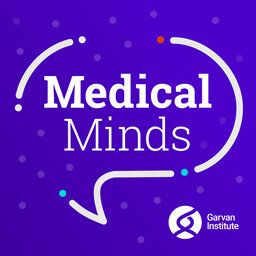
Medical Minds
We dive deep into the minds of our amazing researchers to find out how they tick and how they are working to make our lives better.Social links:
Follow the podcast:

Arthritis: uncovering pathways to better treatment
Arthritis affects millions of people, but the underlying causes are still not fully understood. What makes the immune system that normally protects us suddenly attack our joints? And why do arthritis flares seem to arrive without warning? In this episode, we explore how certain immune cells or sig…
28:41
Liver cancer: discovering the next generation of therapy targets
For decades, the fight against cancer has focused on killing the tumour cell. We treated cancer like an isolated entity that needed to be destroyed – but what if we’ve been looking at the wrong target? In this episode, we delve into the critical insight that cancer is not just a rogue cell – it’s …
24:06
Biologics- engineering tomorrow’s medicines
Therapies and drugs have evolved enormously in the last 30 years. For example, in cancer, where previously our options were limited to surgery, chemotherapy and radiotherapy, we’re now hearing terms like cancer immunotherapy, targeted therapies and even cancer vaccines. Many of these are biologics.…
27:27
Breaking the barriers to treating pancreatic cancer
Pancreatic cancer is one of the toughest cancers to treat – it’s aggressive, often diagnosed late, and doesn’t respond well to standard therapies. In this episode, we meet Professor Marina Pajic who is working at the cutting-edge of science to transform how we understand and treat this disease.
27:24
Accelerating discovery, empowering translation
Garvan is one of Australia's largest independent medical research institutes with a single focus: to make discoveries that will improve health for all. In this episode, you’ll hear from Executive Director Professor Benjamin Kile on how he came to be at Garvan's helm and his strategy for driving ext…
35:06
Hope for Parkinson's, ataxia and dystonia
In Australia alone, 50 people are diagnosed with Parkinson's every day. Therapy options are limited, as they are for other movement and muscle disorders, such as ataxia and dystonia. In this episode of Medical Minds, we meet neurologist and researcher Associate Professor Kishore Kumar, who is worki…
21:34
Breaking down cancer's defence mechanisms
The human body has an incredible capacity to heal itself – whether it’s a paper cut, a broken bone, or your lungs recovering after a chest infection. But not all types of healing are good for us. Cancers seem to have hijacked the healing process to protect themselves from treatments and to spread m…
31:13
New hope for multiple sclerosis
More than 33,000 people in Australia today are affected by multiple sclerosis, a disabling disease of the brain and spinal cord, for which there is no cure. In this episode, you’ll meet Dr Seyhan Yazar and Professor Tri Phan who are working to better manage, treat and prevent MS, by investigating w…
22:35
How AI is transforming cancer research
Scientific advances have led us to diagnosing, treating and preventing cancer much better than ever before. Still, 10 million people die of cancer every year and what we need now are transformative ideas. In this episode you’ll hear from Dr Amanda Khoury and Dr Braydon Meyer who are using AI to dev…
19:43
Can genomics help treat inflammatory bowel disease?
Our gastrointestinal system contains more than 70% of the body’s immune cells and can house more microbial cells than there are human cells in our entire body. Unravelling all that complexity is more important than ever, with conditions affecting the gut, such as Crohn’s and ulcerative colitis, on …
21:36
 Medical Minds
Medical Minds